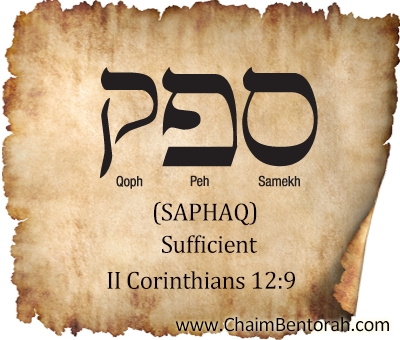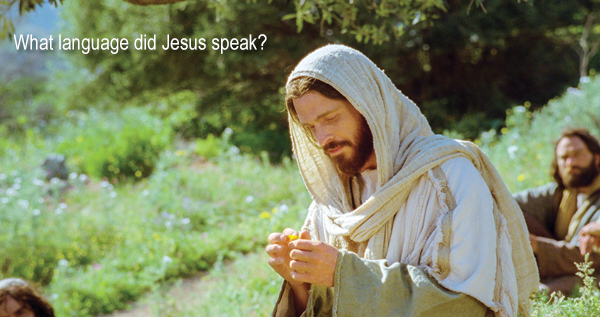Aramaic Word Study – Sufficient – Saphaq
 II Corinthians 12:9: “And he said unto me, My grace is sufficient for thee: for my strength is made perfect in weakness. Most gladly therefore will I rather glory in my infirmities, that the power of Christ may rest upon me.”
II Corinthians 12:9: “And he said unto me, My grace is sufficient for thee: for my strength is made perfect in weakness. Most gladly therefore will I rather glory in my infirmities, that the power of Christ may rest upon me.”
I like the way one translator paraphrased this by saying: “My grace is all you need.” Paul therefore rejoiced in his weaknesses for the power of God rested on him. I need to examine a few words here to understand what Paul is really talking about.
The Apostle Paul could not have been a weak person in character. I mean this old boy had one strong character which is very apparent when you read about him in the Bible. He was not weak in decision-making, lacking courage or commitment. In that, he was powerful and strong.
Thus this weakness has to be more than emotion or courage. I doubt it is weakness in scholarship as he was a member of the Sanhedrin and was well versed in the laws of God. The word for weakness in the Greek is astheneia which is a physical weakness or a physical disability. The Aramaic uses the word korih from the root word korah. This also means a physical weakness, disability or a disease. This is the same word he uses when he says he will glory in his infirmities. I said in an earlier study that this disability was likely arthritis, that is purely a guess but it fits both Greek and Aramaic and the Apostle Paul’s age.
We learn in the next verse that on top of korah, he also suffered insults, hardships, persecutions and difficulties. But he rejoices in these. Korah, however, was different, he needed good health to carry on the ministry not to mention to endure physical hardships. Emotionally, he could handle it but the poor old physical body, not so much. So much so that we learn in the prior verses that she suffered a thorn in the flesh that he called upon God three times to be delivered and each time God told Him His grace was all He needed. The word for grace in the Greek is charis which means a blessing, a favor or a gift. The word is Aramaic is yibotha which means exactly the same thing, a favor or a gift.
I believe that gift is found in this verse. Strength when he was weak. The word strength in Greek is dynamos as we all know is the word we get dynamite from. But in the Aramaic, the word is chila which is an accumulating power and abilities. In other words in his weakness, he discovered abilities and power he never knew he had.
You see what Paul is telling us is that when we depend upon our own power and strength we never give the power and strength of God a chance to manifest. I do not know how this power and strength was manifested but it brought him through many difficulties.
When we face a situation that just saps us of all our strength, it is then that God can reveal what He has already endowed us with. We will never suffer more than we can bear I Corinthians 10:13.
The key is, we don’t get that strength, we already have it, it is a yibotha, a gift that can only be revealed when we have reached the end, when we confront our weakness, then like a supercharger, God’s power kicks in. Fanny Crosby was convinced that she would not have written her beautiful songs if it wasn’t for her blindness.
We as believers will all experience this yibotha. There will come a time when our physical bodies will have reached their limits and what we fear most for all our lives will eventually confront death’s door. When that time comes suddenly God’s yibotha will kick in and like Paul, we will rejoice and welcome it without the fear we thought we would have. It will be there when we need it.
What has always bothered me about this is the word sufficient. How is God’s grace which is the favor of God sufficient to get Paul through his weakness? Just knowing that he has the favor of God is sufficient, just enough to get him through his weakness? The English word sufficient suggests that something is adequate, just enough. Surely, Paul was not satisfied to have adequate from God?
The word sufficient in Aramaic is saphaq which is a word for grafting where you say, tie a fruit branch to a non-fruit tree and that branch will be nourished by the non-fruit tree to bear the fruit of the branch. It is also used for training a horse or camel by tying a rope around one leg of the animal leaving it to balance on three legs making it more trainable and also building a relationship between the trainer and the animal. Thus, when Paul says that God’s grace is sufficient he is saying that God’s grace is that he is using his weakness just like a horse training weakens his horse by tying one leg and then training the horse to perform the task that is expected of it. God’s grace is like grafting you like a fruit branch that does not have the nourishment produce the fruit but when grafted to a tree planted in the ground near waters it will be nourished to produce fruit.
You see, Paul’s only desire was to please God and if he needed to suffer some weakness so God could train him and nourish him to produce fruit then that was enough, that was all he desired. He was satisfied to be able to perform the mission that God created him to perform.
Hi there! Thank you for reading this Daily Word Study. Can I ask a favor? Share this Daily Word Study with your friends on Facebook and Twitter by clicking one of the icons below.
Thanks & Blessings, it means a lot to me!








What a coincidence this is the same verse for my bible sharing to ladies today. It is from Ruach. A child of God walking in His Spirit, according to the System of His Kingdom will always find help and be filled with what is lacking. We just have to obey and in faith yield to the Leading of Ruach Amen for nothing is accidental or chance in the Kingdom we belong to. Amen
I thought 1Cointhians 10:13 was referring to temptation not physical weakness. God makes a way to escape if I look for my escape hatch and am willing to use it.
I understand the available strength. For about 2 years I was sole caretaker for my late wife. I won’t go into all of what I had to do for her but it was a full time job and exhausting. Looking back on it, I am amazed I was able to do it. Now, almost 2 years later, I’m 74 and can hardly get out of bed at times and my overall strength is barely enough to get me through the days. I keep telling proclaiming “Yahweh is my strength” and somehow I keep going. (Yahweh is the name I feel closest to)
This summed up nicely what I wanted to put into words about a situation my daughter’s friend is in. Because of His Sovereignty, it stands to reason that Paul is guiding us towards pleasing God even, and up to the point we’re at death’s door. I am reminded of the song, “It is well with my soul.”
Thank you for this very powerful teaching. I pray I never forget this and I know He will help me too, and this teaching will help others who are suffering in this walk with Him.